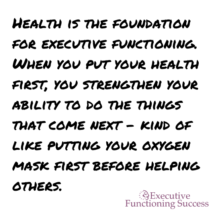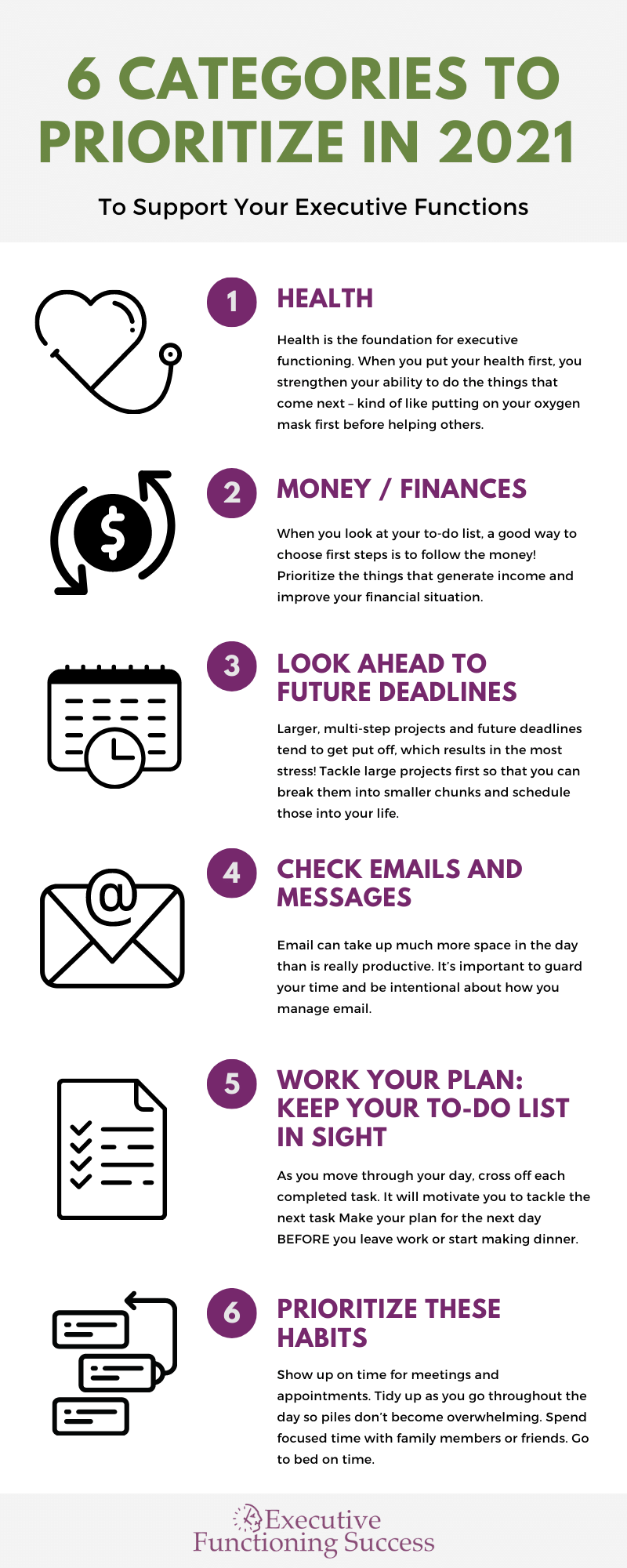I have always loved the beginning of a new year. And like many of you, this year I am especially ready to begin afresh! I have my new Seeing My Time planner to support my executive-function-challenged brain. I’ve also mapped out the steps for a couple of big year-long projects for both EFS and my personal life. I am ready to start!
The process I have just described relates to the executive functioning skills of planning and prioritization. While planning is the skill that seems to hang people up the most, prioritization thwarts a lot of my clients. They report, “Marydee, I am great at making detailed plans, but I get overwhelmed when it comes to deciding what is the most important thing to do as I move through my day. It ALL seems important! How do I know what I am supposed to focus on and in what order?”
My Personal Priority List
To help you decide how to prioritize, I want to share what I do. I’ve created six categories and put them in order, starting from the most important. Throughout my day, I start with #1 and go down through the list in order. The bullet points are examples of tasks connected to each priority category.
1. Health

We tend to push health to our last priority, when in fact it should be our first. Health is the foundation for executive functioning. When you put your health first, you strengthen your ability to do the things that come next – kind of like putting your oxygen mask first before helping others. Here are some examples.
- Make doctor/therapist appointments. Don’t forget checkups
- Reorder prescriptions
- Step on the scale every morning to monitor weight
- Eat a healthy breakfast and pack a healthy lunch
- Plan and DO some sort of exercise. The key is to get your body moving daily
- Personal restoration activity. Plan time for reading, art, meditation, etc.
2. Money/Finances
When we look at our list of to-dos, a good way to choose what to do first is to follow the money! Prioritize the things that generate income and improve your financial situation.
- Get to work on time (If you get fired or laid off for consistently being late you won’t have any money coming in!)
- As I said, work tasks connected to bringing in money should be done first. As you look through your list, put a star next to those things that will generate income, either for you or your workplace
- Pay bills or invoices
- Deal with insurance issues
- File items needed for tax preparation
- Budget and monitor spending. This should be scheduled on a regular basis
- Put money into savings or retirement funds on a scheduled basis
3. Look Ahead to Future Deadlines
Larger, multi-step projects and future deadlines tend to get put off, which results in bringing us the most stress! Tackle them first so that you can break them into smaller chunks and schedule those into your life.
- Check your calendars for work/school projects and personal events that have steps you need to take now to be ready when the deadline arrives. Add the steps to your calendar
- Schedule time today to work on that project to make progress

4. Check Emails and Messages
Email can take up much more space in the day than is really productive, so it’s important to guard your time and be intentional in how you manage email.
- In the morning, scan for “fires” that need your immediate attention and respond (Stop there. Answering all of your emails at the beginning of your day isn’t the best use of your energy and time.)
- Schedule consistent time to respond to emails, ideally twice a day
- Resist looking at emails on your phone throughout the day unless you plan to answer them. You will end up looking at them multiple times and overthinking your response.
5. Work Your Plan: Keep your To-Do List in Sight
- As you move through your day, cross off each completed task. It will motivate you to tackle the next task!
- Remember: Time doesn’t stretch, so you won’t get it all done! That’s ok
- Make your plan for the next day BEFORE you leave work or start making dinner
 6. Prioritize these Habits
6. Prioritize these Habits
Finally, there are several habits that, once engrained, will give you a better sense of control and the ability to prioritize better and make good decisions.
- Show up on time for meetings and appointments. It doesn’t feel good to be late, and it sets the tone for a stressful day. Being on time will boost your morale and help you stay on track.
- Tidy up as you go throughout your day so piles don’t become overwhelming
- Spend focused time with family members or friends
- Go to Bed on Time. All that stuff you think you still need to do? Let it go. Tomorrow is another day. Your brain and body need sleep more than anything else.
Prioritizing your day with these seven categories will help you get the important things accomplished. If you have a brain that is easily distracted, it is critical that you keep your to-do list in sight. I remember one client who told me that she carried her to-do plan with her room to room, constantly checking her list. If it wasn’t on the list, she would stop herself from pursuing the random tasks that popped up in front of her or into her mind.
As we look ahead to 2021, remember that by consciously working on our daily goals, we will have the best year possible.
Little by little… Stay well. Stay safe.
Marydee


